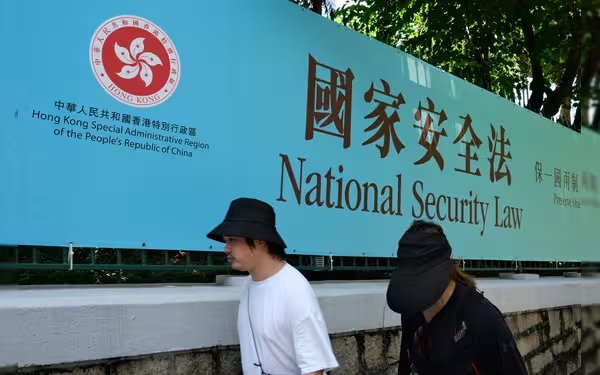Monday, December 23, 2024 12:10 PM
Hong Kong Sentences 45 Activists in National Security Trial
- 45 pro-democracy activists sentenced to up to 10 years.
- Trial raises concerns over Hong Kong's democratic future.
- International community condemns verdicts as politically motivated.
 Image Credits: arabnewspk
Image Credits: arabnewspkHong Kong's High Court sentences 45 activists, raising serious concerns about democracy and civil liberties in the city.
In a significant development for Hong Kong's political landscape, the High Court has sentenced 45 pro-democracy activists to prison terms of up to 10 years. This landmark national security trial has raised serious concerns about the future of democracy in the city, which was once known for its vibrant political discourse. The activists were arrested in 2021 under a controversial national security law imposed by Beijing, which many believe has stifled dissent and curtailed freedoms.
The charges stemmed from the organization of an unofficial "primary election" in 2020, aimed at selecting candidates for a legislative election. Prosecutors accused the activists of plotting to disrupt the government if they were elected. The trial, which lasted 118 days, concluded with 14 activists found guilty, while others either pleaded guilty or were acquitted. Notably, Benny Tai, a prominent figure in the pro-democracy movement, received the longest sentence of 10 years.
The international community has reacted strongly to the verdicts. The United States has labeled the trial as "politically motivated," calling for the release of the activists who were merely participating in legal political activities. In contrast, the Chinese and Hong Kong governments defend the national security law as a necessary measure to restore order following the mass protests of 2019.
As the sentences were handed down, emotions ran high outside the courtroom. Supporters gathered in large numbers, many holding umbrellas in the rain, demonstrating their solidarity with the activists. One mother, Elsa Wu, expressed her anguish as her son was sentenced, shouting, "He’s a good person … he’s not a political prisoner … why does he have to go to jail?" Such sentiments reflect the deep divisions within Hong Kong society regarding the government's approach to dissent.
The implications of this ruling extend beyond the individuals involved. Critics argue that it tarnishes Hong Kong's reputation as a global financial hub, especially as the city hosts an international financial summit aimed at attracting business. The ongoing crackdown on dissent raises questions about the future of civil liberties and the rule of law in Hong Kong.
The sentencing of these activists marks a pivotal moment in Hong Kong's history, highlighting the ongoing struggle between the desire for democratic freedoms and the government's efforts to maintain control. As the world watches closely, the situation serves as a reminder of the importance of safeguarding fundamental rights and the need for open dialogue in any society. The future of Hong Kong's democracy hangs in the balance, and the voices of its citizens will be crucial in shaping that future.













